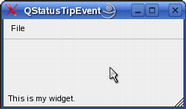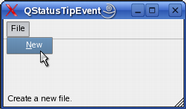[−][src]Struct qt_gui::QStatusTipEvent
The QStatusTipEvent class provides an event that is used to show messages in a status bar.
C++ class: QStatusTipEvent.
The QStatusTipEvent class provides an event that is used to show messages in a status bar.
Status tips can be set on a widget using the QWidget::setStatusTip() function. They are shown in the status bar when the mouse cursor enters the widget. For example:
|
|
Status tips can also be set on actions using the QAction::setStatusTip() function:
|
|
Finally, status tips are supported for the item view classes through the Qt::StatusTipRole enum value.
Methods
impl QStatusTipEvent[src]
pub unsafe fn copy_from(
&self,
other: impl CastInto<Ref<QStatusTipEvent>>
) -> Ref<QStatusTipEvent>[src]
&self,
other: impl CastInto<Ref<QStatusTipEvent>>
) -> Ref<QStatusTipEvent>
The QStatusTipEvent class provides an event that is used to show messages in a status bar.
Calls C++ function: QStatusTipEvent& QStatusTipEvent::operator=(const QStatusTipEvent& other).
The QStatusTipEvent class provides an event that is used to show messages in a status bar.
Status tips can be set on a widget using the QWidget::setStatusTip() function. They are shown in the status bar when the mouse cursor enters the widget. For example:
|
|
Status tips can also be set on actions using the QAction::setStatusTip() function:
|
|
Finally, status tips are supported for the item view classes through the Qt::StatusTipRole enum value.
pub unsafe fn new(tip: impl CastInto<Ref<QString>>) -> CppBox<QStatusTipEvent>[src]
Constructs a status tip event with the text specified by tip.
Calls C++ function: [constructor] void QStatusTipEvent::QStatusTipEvent(const QString& tip).
Constructs a status tip event with the text specified by tip.
See also tip().
pub unsafe fn new_copy(
other: impl CastInto<Ref<QStatusTipEvent>>
) -> CppBox<QStatusTipEvent>[src]
other: impl CastInto<Ref<QStatusTipEvent>>
) -> CppBox<QStatusTipEvent>
The QStatusTipEvent class provides an event that is used to show messages in a status bar.
Calls C++ function: [constructor] void QStatusTipEvent::QStatusTipEvent(const QStatusTipEvent& other).
The QStatusTipEvent class provides an event that is used to show messages in a status bar.
Status tips can be set on a widget using the QWidget::setStatusTip() function. They are shown in the status bar when the mouse cursor enters the widget. For example:
|
|
Status tips can also be set on actions using the QAction::setStatusTip() function:
|
|
Finally, status tips are supported for the item view classes through the Qt::StatusTipRole enum value.
pub unsafe fn tip(&self) -> CppBox<QString>[src]
Returns the message to show in the status bar.
Calls C++ function: QString QStatusTipEvent::tip() const.
Returns the message to show in the status bar.
See also QStatusBar::showMessage().
Trait Implementations
impl CppDeletable for QStatusTipEvent[src]
unsafe fn delete(&self)[src]
Calls C++ function: virtual [destructor] void QStatusTipEvent::~QStatusTipEvent().
impl Deref for QStatusTipEvent[src]
type Target = QEvent
The resulting type after dereferencing.
fn deref(&self) -> &QEvent[src]
Calls C++ function: QEvent* static_cast<QEvent*>(QStatusTipEvent* ptr).
impl DynamicCast<QStatusTipEvent> for QEvent[src]
unsafe fn dynamic_cast(ptr: Ptr<QEvent>) -> Ptr<QStatusTipEvent>[src]
Calls C++ function: QStatusTipEvent* dynamic_cast<QStatusTipEvent*>(QEvent* ptr).
impl StaticDowncast<QStatusTipEvent> for QEvent[src]
unsafe fn static_downcast(ptr: Ptr<QEvent>) -> Ptr<QStatusTipEvent>[src]
Calls C++ function: QStatusTipEvent* static_cast<QStatusTipEvent*>(QEvent* ptr).
impl StaticUpcast<QEvent> for QStatusTipEvent[src]
unsafe fn static_upcast(ptr: Ptr<QStatusTipEvent>) -> Ptr<QEvent>[src]
Calls C++ function: QEvent* static_cast<QEvent*>(QStatusTipEvent* ptr).
Auto Trait Implementations
impl RefUnwindSafe for QStatusTipEvent
impl Send for QStatusTipEvent
impl Sync for QStatusTipEvent
impl Unpin for QStatusTipEvent
impl UnwindSafe for QStatusTipEvent
Blanket Implementations
impl<T> Any for T where
T: 'static + ?Sized, [src]
T: 'static + ?Sized,
impl<T> Borrow<T> for T where
T: ?Sized, [src]
T: ?Sized,
impl<T> BorrowMut<T> for T where
T: ?Sized, [src]
T: ?Sized,
fn borrow_mut(&mut self) -> &mut T[src]
impl<T, U> CastInto<U> for T where
U: CastFrom<T>, [src]
U: CastFrom<T>,
impl<T> From<T> for T[src]
impl<T, U> Into<U> for T where
U: From<T>, [src]
U: From<T>,
impl<T> StaticUpcast<T> for T[src]
unsafe fn static_upcast(ptr: Ptr<T>) -> Ptr<T>[src]
impl<T, U> TryFrom<U> for T where
U: Into<T>, [src]
U: Into<T>,
type Error = Infallible
The type returned in the event of a conversion error.
fn try_from(value: U) -> Result<T, <T as TryFrom<U>>::Error>[src]
impl<T, U> TryInto<U> for T where
U: TryFrom<T>, [src]
U: TryFrom<T>,

